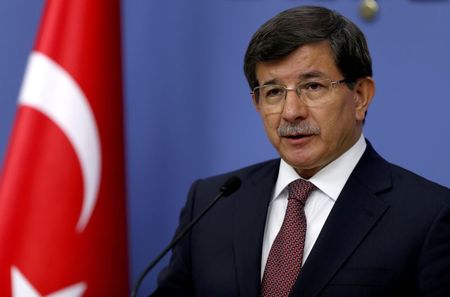By Gulsen Solaker and Nick Tattersall
ANKARA (Reuters) - Prime Minister Ahmet Davutoglu kept key members of Turkey's economic management team in place and named Ankara's point man on Europe as foreign minister in a new cabinet on Friday, moves signalling President Tayyip Erdogan's continued domination.
Erdogan, who had held sway over politics as prime minister since 2003, was sworn in on Thursday as Turkey's first popularly-elected president, cementing his position as its most powerful leader of recent times.
Erdogan is likely to retain influence over the new team, with his former aide Yalcin Akdogan and Numan Kurtulmus, the deputy chairman of the ruling AK Party and another close ally, both named as deputy prime ministers.
"This cabinet carries Erdogan's signature," said Huseyin Yayman, a columnist and political science professor at Ankara's Gazi University.
The new government takes office at a challenging time for Turkey, with economic growth - one of the pillars on which the popularity of the AK Party is based - slowing and the map of the Middle East being rapidly redrawn around it.
Outgoing EU Affairs Minister and career diplomat Mevlut Cavusoglu becomes foreign minister, replacing Davutoglu, suggesting that reinvigorating Turkey's stalled European Union membership negotiations could be a priority.
Volkan Bozkir, the former head of parliament's foreign relations commission who has held several diplomatic posts in Europe, takes over as EU minister.
Deputy Prime Minister Ali Babacan, who had responsibility for economic affairs in the last cabinet, Finance Minister Mehmet Simsek and Economy Minister Nihat Zeybekci all kept their posts, as did Energy Minister Taner Yildiz.
"This is a conservative cabinet in the sense that there are no breaks with the former political team of Erdogan, especially on economic policy," said Sinan Ulgen, head of the Center for Economics and Foreign Policy Studies in Istanbul.
"This shows that the Davutoglu government is very much aware of Turkey's economic vulnerability and is not going to take any risks," he told Reuters.
Babacan is widely respected by foreign investors, who hope he will retain responsibility for economic affairs. But markets were somewhat unnerved by the appointment of Kurtulmus, a former economics professor who they feared may start to eclipse him.
Listing priorities shortly after his appointment, Kurtulmus said Turkey needed to embark on constitutional reform, advance a Kurdish peace process and establish "a new economic programme with the determination to increase our economic power".
It was not immediately clear whether he would have a formal role on the economic team, with the portfolios of the four deputy prime ministers expected to be clarified after the first cabinet meeting in the coming days.
The lira and stocks weakened partly on the uncertainty, although some traders said the afternoon sell-off was also due to global risk adversity and a shift in trading positions ahead of the weekend.
BIGGER CHANGES LOOM
Erdogan has said that the new cabinet under Davutoglu will not simply be a "caretaker" government, addressing fears that he will continue to try to dominate daily politics, but a deeper shake-up is likely after a general election due next June.
Several ministers - including Cavusoglu, Babacan and Yildiz - will be prevented from serving again by a three-term limit imposed by the AK Party on its members of parliament.
The latest changes mean intelligence chief Hakan Fidan, who was seen as a candidate for foreign minister, Justice Minister Bekir Bozdag and Interior Minister Efkan Ala remain in place.
All three are pivotal players in Erdogan's battle with the "parallel state", a term he uses for the network of ally-turned-arch-foe Fethullah Gulen, a U.S.-based cleric he accuses of trying to infiltrate institutions including the police and judiciary to seize the levers of state power.
The power struggle dogged Erdogan's final months as prime minister and saw him purge thousands of police and hundreds of judges and prosecutors, steps that raised concern among Western allies and investors about judicial independence in Turkey.
Erdogan and Davutoglu have also made clear that a peace process with Kurdish militants, aimed at ending a three-decade insurgency in Turkey's southeast, will remain a priority for the new administration.
Besir Atalay, a former deputy prime minister who had helped oversee the peace process, loses his job in the new cabinet but Akdogan will take over his role on the Kurdish issue, officials said, and act as a bridge between Erdogan and the cabinet.
"Akdogan may be a critical channel for establishing the link between the presidential office and the government, given that Erdogan wants to maintain an active political position," said Ilter Turan, professor of political science at Bilgi University.
Erdogan's opponents fear his ascent to the presidency heralds a more authoritarian rule and that his roots in Islamist politics mean his move to the presidency will bring widening religious influence in public life.
Victory in Turkey's first popular presidential election this month gave a him a fresh mandate to push on with what he sees as a historic mission to transform Turkey domestically and as a regional power.

Erdogan has made clear he plans to establish an executive presidential system, expanding the role's current powers.
(Additional reporting by Orhan Coskun, Jonny Hogg and Ayse Sarioglu in Ankara, Daren Butler and Dasha Afanasieva in Istanbul; Writing by Nick Tattersall; Editing by Ralph Boulton)
